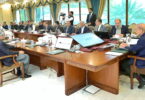Naimat Khan
KARACHI: Hasaan, a terrorist who was killed on Sunday following attack on Khawaja Izhar Hasaan, Leader of Opposition in Sindh Assembly and Member-Central Information Committee-MQM-P, abandoned normal life after his father opposed his ‘love marriage’, one of his neighbors told The Frontier Post.
“Few years back, Hasaan fell in love with a girl and the couple wanted to tie the knot but his ‘ultra rigid’ father opposed,” a youth, who lives in Kehkashan Homes near Sohrab Goth told this scribe on the condition of anonymity.
“Dr Israr, Hasaan’s Father, who the neighbor claims is wrongly reported to be a teacher, objected to his new look when he grew beard but failed to notice an inner change inside his son.”
According to the neighbor, Hasaan had no prior relations with any religious group but was once beaten up by activists of the All Pakistan Mohajir Student Organization (APMSO) in his Private Engineering University situated at main university road, due to which he developed ‘special’ hatred for the MQM.
SSP Rao Anwar claims that Hasaan was part of the Ansarul Sharia Pakistan (ASP) network and accomplice of Abdul Karim Sarosh Siddiqui, who on Monday morning escaped after a gun battle with police.
According to official sources father of Hasaan has been detained who is likely to disclose more information regarding his son but not so close relation with his son will fail him to offer anything regarding the process of change in slain terrorist.
Although the youth’s growing inclination towards extremism and terrorism is widely believed to have a direct link with hate literature and poverty, at least three youth from Karachi have had other reasons, which pushed them towards radicalization; The Frontier Post reported nearly two years back on October 27, 2015.
“The letters written by Saad Aziz, a former IBA graduate and prime suspect in Safoora Goth massacre and Sabeen Mahmud murder case, reveal the fragile relationship he had with his family members, which led him, closer to the militants,” told Raja Umar Khattab, a senior counter-terrorism officer, who unearthed a group of highly educated terrorists in the city.
As if Saad’s breakup with his girlfriend was not enough, his sister’s continuous squabbles, and apathetic behavior of his mother further alienated him, thus making him vulnerable for the terrorists to enfold him in their circle, added Khattab.
According to Aziz’s writings, his father had no or little say during family fights, and he was getting disillusioned by the day. There was no one to listen to his point of view, he told investigators.
Aziz, during interrogation, confessed to have killed Mahmud – director of popular cafe – the Second Floor Café (T2f) – in city’s Defence area. But Aziz was not the only case highlighting how important family bonds are to keep the youths away from extremist inclinations.
On October 11 2015, Karachi police held two men – Bilal Rind and Zain Shahid after the later’s failed attempt to fly to Turkey and then Syria to join the Islamic State – in their fight against Bashar Al Assad – the Syrian ruler.
Police told this scribe that there was no local presence of IS, and both the men were recruited through Twitter. Both, recruited separately, were introduced to each other before they left for Iran with a human trafficker.
Shahid and Rind were arrested in a remote Iranian town along the Turkish border. They were later deported by Iran and handed over to the Federal Investigation Agency (FIA) which handed over them in the detention of the Sindh police’s Counter-Terrorism Department (CTD).
Bilal, who settled in Karachi in 2013, was born in Dubai in 1986 and had got his education the American University in Dubai in 2006. Zain was born in Saudi Arabia and upon his return to Pakistan got his bachelor degree from Iqra University.
With no Madrassah or Pakistani educational background the economically sound youths were living in families least concerned about their kids, investigators say. “During examination by forensic psychologists it emerged that lose family bonds and indifferent attitude of the family was a major cause of the drastic shift in their lives” the police officer said.
According to the police, Bilal Rind was a ‘party boy’ and had spent his life abroad. Even a young preacher can bring a 180 degree shift in their thoughts, says Khattab, adding as soon as Rind was contacted by IS men, he was abandoned by the family, and it took him no time to become a Mowlvi. Shahid’s case is no different, adds the counter-terrorism officer.
“Broken families that are not with separated parents but still their mornings start with squabbling, affect the teens, pushing them towards destructive thoughts”, says Dr Fateh Muhammad Burfat – founding chairman of the department Criminology University of Karachi.
“An anti-crime society has to be developed to eliminate the menace of extremism for which proactive families – where the kids share every problem with their parents and elder brothers – and education based on societal ethics is to be ensured”.






